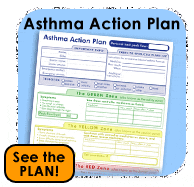- Parents Home
- Para Padres
- A to Z Dictionary
- Allergy Center
- Asthma
- Cancer
- Diabetes
- Diseases & Conditions
- Doctors & Hospitals
- Emotions & Behavior
- First Aid & Safety
- Flu (Influenza)
- Food Allergies
- General Health
- Growth & Development
- Heart Health & Conditions
- Homework Help Center
- Infections
- Newborn Care
- Nutrition & Fitness
- Play & Learn
- Pregnancy Center
- Preventing Premature Birth
- Q&A
- School & Family Life
- Sports Medicine
- Teens Home
- Para Adolescentes
- Asthma
- Be Your Best Self
- Body & Skin Care
- Cancer
- Diabetes
- Diseases & Conditions
- Drugs & Alcohol
- Flu (Influenza)
- Homework Help
- Infections
- Managing Your Weight
- Medical Care 101
- Mental Health
- Nutrition & Fitness
- Q&A
- Safety & First Aid
- School, Jobs, & Friends
- Sexual Health
- Sports Medicine
- Stress & Coping
How Can I Deal With My Asthma?
How Can I Deal With My Asthma?
The best way to manage asthma is to follow an asthma action plan. Your doctor will give you a plan designed just for you. Doing everything on the plan — even when you feel well — will help prevent flare-ups and keep you out of the ER.
Ways to Breathe Better
Once you've got a plan in place, these tips can help you stick with it:
- Understand your plan. Ask your doctor to explain why each medicine and step of your asthma action plan is important. If you understand exactly what's going on, you'll feel more in control. Go over the plan whenever you see your doctor, and explain where you may have had trouble with it and why.
- Use asthma management tools. Even if you're feeling absolutely fine, don't abandon tools like daily long-term control medicines (also called "controller" or "maintenance" medicines) if they're a part of your treatment plan. Although it can be tempting to skip recommended daily meds and rely only on occasional quick-relief medicines, this usually doesn't work.
- Set up a schedule. It can be easy to slip up and forget to take a medicine — but this is less likely to happen if you plan to take medicines or do other asthma management tasks at the same time every day. Make your medicine part of your daily routine, like brushing your teeth.
- Don't smoke. Talk to your parent or a doctor about how to quit if you smoke. If your friends smoke, don't stand nearby when they light up because secondhand smoke is a common trigger of asthma attacks. If someone in your family smokes, talk with him or her about quitting.
- Control your environment. Environmental triggers, such as dust mites and pet dander, can be hazardous if you have asthma. If you have pets, keep Fido or Fluffy out of your room. Also, try to keep your room dust free by cleaning it regularly, and talk to your doctor about using special mattress and pillow covers.
- Get a flu shot every year. Health officials recommend that all kids and teens get a flu shot. Flu shots are particularly important for people with asthma. When someone with asthma catches the flu, he or she has a higher chance of developing a more serious illness.
- Find a sport or activity that works for you. Some sports, such as swimming and baseball, are less likely to trigger asthma flare-ups. But many athletes have found that with proper training and medicine, they can play any sport they want — even endurance or cold-weather sports. Sports can boost your mood, and that's a great help for those times when you may feel frustrated about having asthma.
Using a management plan to deal with asthma is good for more than your health. Getting used to following an asthma action plan can give you the discipline to stick with a plan and succeed in other areas of life as well.

© 1995- The Nemours Foundation. KidsHealth® is a registered trademark of The Nemours Foundation. All rights reserved.
Images sourced by The Nemours Foundation and Getty Images.
